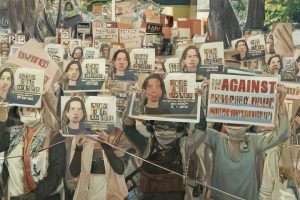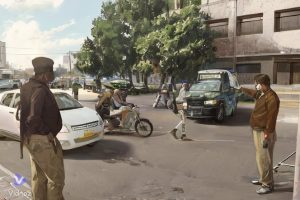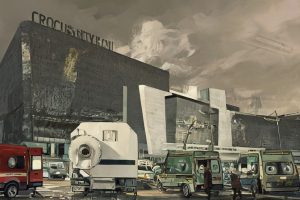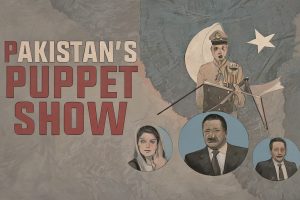By Usman Khalid
The forthcoming elections are very important because these are the first taking place in an environment of constitutional checks and balance working satisfactorily. That does not mean that parliamentary democracy has started to work as well inPakistanas in theUK– the country on whichPakistanhas modelled its political and judicial system. But there is an air of optimism inPakistanbecause the judiciary has survived challenges to its independence and the press is completely free – perhaps too free. The Parliamentary System is considered to better than the Presidential System (of theUSA) which is too costly and success in elections depends on how much money the candidates can raise from donations, blackmail and stealing from the state. That advantage of being less costly is not apparent in the elections inPakistanbecause the party system revolves around the political class rather than the people. But that is a separate subject I will write about later. At this time, the focus is and needs to be on the present ground realities and the expectation of a legitimate popular administration being installed in the country in consequence of the elections. The prospects are good.
Regardless of the system, the voters lean towards the party with a more popular leader. All polls suggest that Imran Khan has been the most popular leader. But doubts about him are just as strong as the support to him which comes from fellow pathans in KPK and certain areas in thePunjab. The doubts pertain to his judgement. He has constantly misjudged what is best for him, his party and the country. What is worse, he changes course or stand either too late or not at all despite his misjudgement becoming evident. Sometimes his stand is vastly damaging because it reveals confusion, lack of realism and inability to articulate the stand and take it to its logical conclusion. He has displayed arrogance even in articulating the party stand. His stand on war inAfghanistanis: “it is NOT our war and that he will get out of it ASP”. ButPakistanneither has troops nor volunteers inAfghanistan; and it does not give money or weapons to the Taliban fighters. What is it thatPakistanwill cease to do if Imran was making decisions? The vagueness and absurdity of his stand is mind boggling. The same has been the case with his manifesto. He says he has a very good team of experts who have written papers on every subject the summary of which is in his published manifesto. But apart from Asad Omer, there is no one on his team who does anything other than shouting obscenities on TV. The manifesto of TIP is not different to that of other parties all of which are a “wish list” and do not include any hint of a legislation or executive order. However, there is one important exception; his is the only party that will oust the occupants of all Government Houses and convert the buildings into libraries.
The PPP led by the President, Asif Zardari, is expected to win the most seats in Sindh and come second in the number seats in the National Parliament. It has lost support in the Punjab, KPK andBaluchistanwhere the vote bank of his late wife – Benazir Bhutto – remained loyal to the PPP in 2008 Elections. Zardari has lost support also because he is held in suspicion and contempt because he is personally seen to be disloyal to Bhutto legacy. The vote bank of the PPP drew inspiration from the patriotism of Late Prime Minister Zulfikar Bhutto and his charismatic leadership recognised by the Muslim World and valued byChina. By aligning himself with the nemesis of the Bhuttos – the MQM and the ANP – Zardari has lost his claim to be a legitimate inheritor of the Bhutto legacy. If Mumtaz Bhutto – who has joined the PML(N) – contests and wins the Larkana seat where the sister Asif Zardari, Faryal Talpur, is the candidate, Nawaz Sharif’s Party could win big even in Sindh. With an alliance with PML(F) and Sindhi nationalists, the stranglehold of the PPP over Sindh may be broken for ever.
At the moment all indications are that PML(N) led by Mian Nawaz Sharif would emerge as the party with the largest number of seats in the next parliament. However, there is little enthusiasm for Mian Nawaz Sharif because he has been the Prime Minister twice before and he failed to win the trust of the people or the institutions of the state. In fact, he got entangled in entirely avoidable confrontation with the military as well as the judiciary. He has since built bridges with the judiciary but his relations with the military are still tense. Given that the military has always looked at a leader with suspicion who put business relations withIndiaabove the security of the state, the tension is likely to persist. The new term of Mian Nawaz Sharif as the Prime Minister would begin in an environment of trepidation. That does not auger well for the country. It is possible that he may allow his younger brother Shahbaz Sharif to be the next Prime Minister. Or he could assemble a security and foreign policy team that reassures friends and puts the one and only enemy ofPakistan-India– on notice thatPakistanwould give priority to its own political compulsions onJammu and Kashmir. If he did one or the other,Pakistanwould be well set on a course of regional peace and double digit economic growth.
The press plays an increasingly important role in crystallisation of national aims and objectives and building public support. Thus far, it has missed the point in its choice of direction and emphasis. Soon after the death of General Zia Ul Haq in 1988, the press emphasised that if elections are held regularly the system would correct itself and competent and honest leadership would emerge. Four elections were held between 1988 and 1997 which resulted in Benazir and Nawaz Sharif alternating twice each in power and their second tenure was more dismal than the first. We tend to forget that the coup d’état by General Musharraf in 1999 enjoyed public support. After personal rule of three years he restored democracy and ruled for another five years with the help of the mohajir (refugees fromIndia) and a crop of turn coats. Completing five years by his ‘elected administration’ was touted as a great achievement. The nightmare culminated in a confrontation with the judiciary unwilling to allow a General in uniform to contest the Presidential Election. He dismissed the judges reluctant to endorse his PCO and made history by incarcerating all of them. In desperation, General Musharraf made a deal with the main leader of opposition to him, Benazir Bhutto, giving her permission to return from exile and contest elections. In a twist of fate, she was assassinated before the elections and her disreputable husband assumed leadership of the party on the basis of a will by Benazir Bhutto generally thought to be a forgery. The real nightmare ofPakistan began.
It has since been revealed that the deal between Musharraf and Benazir had been mid-wifed by theUSSecretary of State Condoleezza Rice. It isAmericathat installed and sustained President Zardari in power; it is theUSAthat chose his coalition partners, MQM and ANP; it isAmericathat dictated his foreign policy. The military went along with all that until the Raymond Davis affair which revealed that the real aim of theUSAwas the disintegration and denuclearisation ofPakistan, which had been pursued behind the cover of Kerry-Lugar bill. The Raymond Davis Affair was a watershed ;Americarealised that the game was up; its effort to destabilise a country it called an ally was more than a failure, it was counter-productive.Americareacted and reversed policy quickly as shown during the Memogate affair when a memo by President Zardari “agreeing to meet theUSobjective in full” was made public by the CIA agent trusted to transmit the memo. Zardari understood that the military had all the cards and that theUShad ceased to support his chicanery. Zardari wisely allowed General Kiani to take the lead in regional foreign policy. As things stand today, there is good understanding between theUSAandPakistan. TheUSAhas conceded that its policy to giveIndiaa role inAfghanistanandCentral Asiais not going to work. It is willing to work withPakistanto bring peace and stability to the region.Pakistan, on its part, realises that theUSAmay well have to maintain a powerful non-military presence inAfghanistan.
All this is too complicated for the simple mind of Nawaz Sharif but he is still fixated on being on top of the military. It was that fixation which was the reason of all his major mistakes – appointing Pervaiz Musharraf as the Army Chief, the Kargil Operation, and trying to replace Musharraf mid-air. PML(N) victory would be the best thing for Pakistan in the forthcoming elections. But has he become wise after all those blunders? That is the question that haunts Pakistan’s intelligentsia today.




